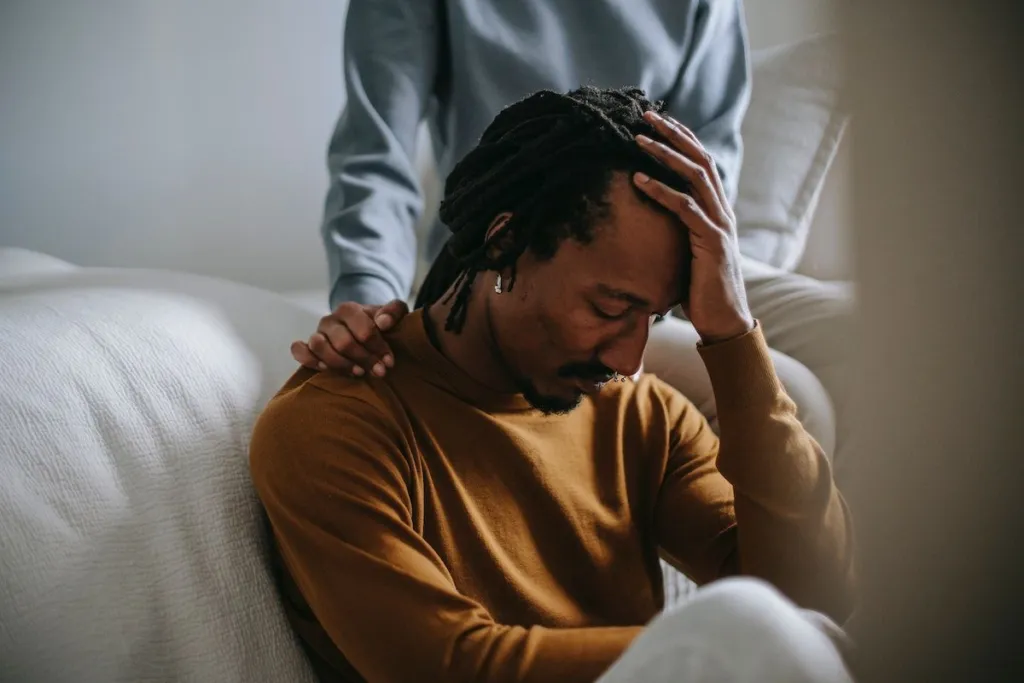Sadness, Loss, and Death
The normal and healthy response to an emotionally important loss, most of the time the death of a loved one, is to feel sad.
Even though loss is a normal part of life, it’s not easy to grieve. Though everyone’s grief is different, it is common for people who are grieving to show signs of common mental illnesses like depression or worry. Not having a mental illness is not the same thing as sadness, but strong grief feelings that last for a long time after a loss can make it hard to live a healthy life.
If you’re having a hard time getting over a loss, you might benefit from seeing a therapist who specializes in grief. Find out more about sadness, different ways to treat it, and how to choose a therapist by reading on.

Signs of being sad
Grief often looks like a sign of depression, but how different people respond to loss is very different. Feelings aren’t right or wrong. In any case, here are some of the most common signs:
In the beginning, people often feel shocked and don’t believe what they’re hearing. Even if you knew you were going to lose someone, these feelings can last for days or even years, making you feel disconnected from reality and your emotions.
-
- You may feel lost, sad, confused, or hopeless at some point during the loss process. Sometimes these feelings will be too strong for you to handle.
-
- You may feel that the loss you’ve been through was unfair, or you may be generally angry and short-tempered with the people around you.
-
- Guilt or self-blame: Some people think they caused the loss or are still thinking about what they should or should not have said.
-
- Feeling mentally numb or disconnected: You might not be able to connect with people or events.
Separation anxiety means that you might be scared or worried about not being able to be with the person you’ve lost.
- Feeling mentally numb or disconnected: You might not be able to connect with people or events.
-
- Fear of the future: It’s normal to worry about what the future will hold without the person you love. You may think about things that will happen in the future without your loved one.
-
- Focusing: You may feel like your mind is foggy in general, and it may be harder for you to concentrate and think things through.
-
- Loss of interest in things that make you happy: When you’re grieving, the things that used to make you happy, like people, hobbies, and sex, may seem dull, boring, or even sad.
-
- Changes in how much or how little you eat: Grief can make you sleep or eat too much or too little. You might be worn out or tired.
-
- Thoughts of suicide or death: People who are going through a lot of sadness may become obsessed with death and think about committing suicide.
There is no “normal” amount of time to deal with loss, but these symptoms usually get better over time.
Different kinds of sadness and loss
Everyone deals with grief in their own way. Still, here are some of the most common situations that happen during grief:
People who are psychologists talk about the normal stages of grief that don’t turn into difficult grief as “acute grief.” This can feel very different from what is expected. This could include forms of any of the above symptoms that are milder or don’t last as long. Even though simple sadness isn’t a mental illness, it can be very hard, so you might want to get help while you’re going through it.
Grief that is difficult: Complicated grief, which is also called Persistent Complex Bereavement Disorder, is a term for sadness that doesn’t go away for a long time. It usually includes having some of the above symptoms for a long time and very strongly, as well as big changes in personal relationships and a feeling that life has no point. A therapist might be able to help people who are going through difficult loss.
If someone is grieving but feels like they can’t show it in public, this is called “disenfranchised grief.” Some examples are parents who have lost a stillborn baby or people who have lost pets they loved. Grief over the death of someone whose connection with you is seen as shameful (like a partner in an affair) or over the death of someone who died in a way that is seen as shameful (like by suicide or drug overdose) could also be part of this. Judgments from other people can make a hard situation even worse if you’re going through frustrated grief.
Tragic grief: It can be very hard to deal with grief after a death that happened in a painful way. There may be violent or sudden deaths in this group, as well as deaths of children or teens who did not live out their full lives. Researchers have found that traumatic losses are often linked to long-term grief. Grief related to a loss other than the death of a loved one: Grief can happen when you lose a job, your home, a friendship or another loved one, or your ability to move around or be independent after becoming disabled. If you’re sad about something that most people don’t think is a good reason to be sad, this type of grief can overlap with powerless grief.
How grief fits into community norms: Different cultures have very different ideas and ways of dealing with loss. Some cultures may encourage people to grieve for a long time or be open about their feelings, while others may encourage a more calm response. If your personality doesn’t fit with what people in your culture expect of you, grief may be especially hard for you.
How common problems are that come with sadness and loss
After a painful loss, most people go through some kind of sadness. Some people, though, feel very sad for a year or more after the death.
Complicated grief is this kind of intense, long-lasting sadness. One study found that about 7% of people who lose a loved one progress to this stage of grief.
There are some studies that show women may be more likely than guys to have complicated grief.
Different stages of grief
Remember that there is no set time or “normal” way to grieve; everyone handles loss in their own unique way. Most people agree that there are four stages of grief that everyone goes through at some point:
-
- Having faith that the loss is real
-
- Having pain from the loss
-
- Getting used to living without your loved one
-
- Putting your mental energy into other things instead of grieving
-
- It is normal for things to not go easily between stages. You may go through more than one at the same time.
Different ways to treat sadness and loss
Getting one or more of the following might help you deal with the mental pain of loss:
-
- Therapy: Talk to a therapist who can help you deal with your sadness, find ways to handle your pain, and move on to the next part of your life. Here are some more tips on how to choose a therapist and the different kinds of treatment.
-
- Helpful groups: A support group can help you deal with your feelings and find comfort in talking to people who are going through the same things you are. Support groups are often made for people who are going through certain types of sadness, like bereavement after the death of a child.
-
- Talk to other people: Talk to someone you know, like a family member or friend. It can help to talk about the loss, remember the person who died, and get better. You may also be helping other people deal with their loss at the same time.
-
- Taking care of yourself: During this time, it’s important to do things like eat well, get enough sleep, and stay busy. Walking or swimming are good forms of exercise that can help you find meaning in your life and may also help people who are depressed or anxious feel better.
-
- Relaxation skills: Learning a breathing or relaxation practice can help you deal with grief symptoms, especially in the days or weeks after the loss. You can use online self-help tools or download an app to learn how to meditate, control your breathing, or rest.
Writing down your thoughts and feelings in a journal may help you understand your sadness better and give you a way to freely express yourself.
Hotlines: Call the National Suicide Prevention Hotline at 1-800-273-8255 if you are thinking about suicide or need help right away. Toll-free at 1-800-622-4357, the Substance Abuse and Mental Health Services Administration’s hotline can also help you find resources and treatment choices.
Help for grief and loss
Therapists use a wide range of treatment types and methods to help people get through the grieving process. It’s important to think about the choices you have and pick the one that feels most right to you. Here are some examples of common types of therapy:
-
- Cognitive behavioral therapy (CBT): CBT helps us recognize and change unhelpful ways of thinking and acting that are linked to loss and can make sadness worse, like blaming ourselves. CBT helps people deal with their grief and understand what they’ve lost.
-
- Interpersonal psychotherapy (IPT): IPT helps people feel less pain by helping them reconnect with their social supports, make new friends, and work toward their own personal goals.
-
- CGT stands for Complicated Grief Therapy. This fairly new model is meant to help people who are having a hard time with their grief. It is based on attachment theory and includes parts of other types of therapy, such as CBT and IPT. It means facing the thought of the loss while also focusing on relationships and goals for the future.
-
- One helpful way to use existential therapy to deal with grief is to look at how one finds meaning in their life after a loss. As you work to build a worthwhile life, you think about the loss, deal with it, and better understand it.
-
- Understanding and Accepting Loss (ACT): ACT uses parts of both cognitive behavioral therapy (CBT) and mindfulness, along with other methods, to help us accept loss and deal with it in a new way.
What to look for in a grief and loss therapist
When choosing a loss therapist, there are a few things you should think about, such as:
-
- Specialization: Look for a therapist who has experience and training in the type of treatment that works for you and grief. Most of the time, they put this information in their bio on their website or online page.
-
- Qualifications: There are a lot of different types of mental health professionals out there, so it can be hard to choose which one to see. The most important thing is to find a therapist who is qualified right now.
-
- Getting along with your therapist (called the “therapeutic alliance”) is very important for how well treatment works. To talk about the death of a loved one, it’s important to do so with someone you trust and who makes you feel heard.
-
- Get a call from the counselling psychologist first. This is the best way to figure out how you might feel about them. You can also ask them about their experience and what it will be like to go to therapy with them. Before you choose a therapy, talk to a few of them.




